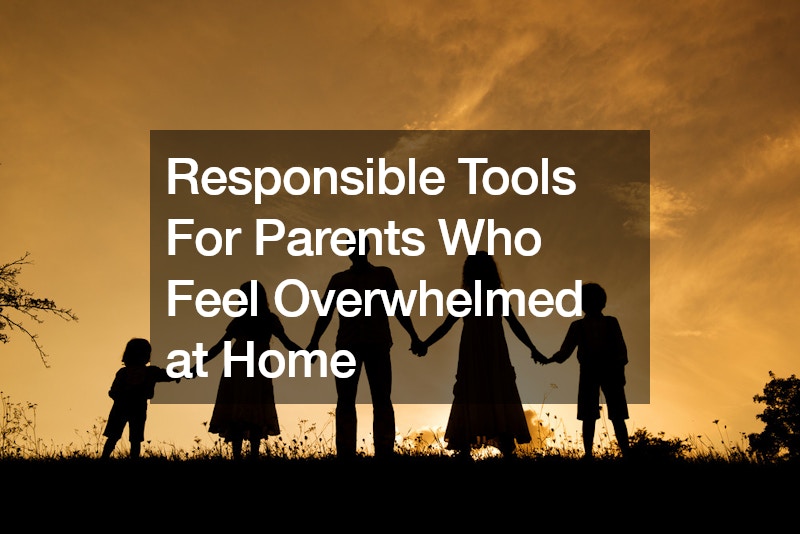
Responsible Tips
Parenting can be one of the most rewarding yet challenging roles in life. As parents, we often find ourselves juggling multiple responsibilities, from managing our careers to ensuring our children’s well-being and development. It’s not uncommon to feel overwhelmed, especially when balancing all these demands at home. The good news is that there are various responsible tools for parents designed to alleviate some of these pressures and create a more harmonious home environment. These tools can range from practical daily routines to digital resources that support learning and development. By leveraging these tools, parents can create a more structured, calm, and supportive environment for their families, ultimately enhancing the overall well-being of both parents and children.

Establishing Effective Routines for Children
Creating and maintaining effective routines for children is crucial in providing them with a sense of stability and security. Routines help children understand what to expect throughout the day, which can reduce anxiety and behavioral issues. A well-structured daily schedule includes consistent meal times, playtime, learning activities, and bedtime rituals. These routines not only benefit children but also allow parents to manage their time more efficiently. By establishing clear routines, parents can ensure that all essential tasks are completed, leading to a more organized and less stressful household.
Specifically, incorporating daycare services can be an excellent tool for parents who need additional support during the day. Daycare provides a structured environment where children can engage in educational and social activities, giving parents peace of mind while they focus on their work or other responsibilities. The predictable schedule of daycare aligns well with home routines, creating a seamless transition for children. This integration allows parents to maintain a consistent daily rhythm, knowing their children are well cared for and engaged in productive activities.
Utilizing Educational Apps for Learning
In today’s digital age, educational apps have become invaluable tools for parents looking to enhance their children’s learning experiences. These apps offer a variety of interactive and engaging content that can support children’s cognitive and emotional development. From math games to language learning programs, educational apps can supplement traditional learning methods and make education more enjoyable for children. They provide a flexible learning platform that can be accessed anytime, making it easier for parents to integrate learning into their daily routines.
When considering the use of educational apps, parents might explore the offerings of a design build firm that specializes in creating custom learning environments. These firms can design tailored solutions that integrate technology seamlessly into home learning spaces. For example, a design-build firm might create a dedicated learning nook equipped with tablets, interactive whiteboards, and educational software. This approach ensures that educational tools are easily accessible and integrated into the home environment, fostering a culture of continuous learning and development. By leveraging the expertise of such firms, parents can create an optimized learning space that encourages their children’s academic growth.

Incorporating Mindfulness Practices for Parents
Mindfulness practices can be incredibly beneficial for parents who feel overwhelmed by the demands of daily life. These practices, which include meditation, deep breathing exercises, and mindful movement, help to reduce stress and improve emotional regulation. By incorporating mindfulness into their daily routine, parents can develop greater awareness and presence, which can lead to more positive interactions with their children. This increased sense of calm and control can also improve overall family dynamics, creating a more peaceful home environment.
Specifically, parents can look into a support system for mental health that offers resources and guidance on mindfulness techniques. Many mental health organizations provide workshops, online courses, and counseling services designed to help parents integrate mindfulness into their lives. These resources can be powerful tools for parents, providing them with practical strategies to manage stress and enhance their well-being. By taking advantage of these support systems, parents can cultivate a more balanced and mindful approach to parenting, benefiting both themselves and their children.
Creating a Calm and Organized Home Environment
A calm and organized home environment is essential for reducing stress and promoting well-being for both parents and children. Clutter and disorganization can contribute to feelings of chaos and overwhelm, making it difficult for families to relax and enjoy their time together. By implementing organizational strategies and creating designated spaces for different activities, parents can transform their homes into havens of tranquility. This process might involve decluttering, using storage solutions, and establishing zones for play, work, and relaxation.
For a more specific approach, parents might consider window replacement to enhance their home’s comfort and efficiency. Old, drafty windows can make it challenging to maintain a stable indoor climate, leading to discomfort and higher energy bills. Upgrading to energy-efficient windows can improve indoor air quality, regulate temperature, and reduce noise pollution, all of which contribute to a more serene home environment. These improvements can be valuable tools for parents looking to create a more comfortable and organized living space for their families.

Leveraging Online Support Communities for Advice
Online support communities can be an invaluable resource for parents seeking advice, encouragement, and a sense of connection. These communities, which can be found on social media platforms, forums, and dedicated parenting websites, offer a space for parents to share their experiences and learn from one another. By participating in these online groups, parents can gain insights into various parenting challenges, discover new strategies, and feel supported by a network of peers who understand their struggles.
Parents dealing with specific issues, such as navigating the complexities of professional medical billing, can find targeted advice and support within these communities. For example, parents of children with special medical needs might join forums where they can discuss insurance claims, billing discrepancies, and strategies for managing medical expenses. These online support communities can be essential tools for parents, providing them with the knowledge and emotional support needed to tackle challenging situations. By leveraging these resources, parents can feel more confident and empowered in their parenting journey.
Implementing Time Management Strategies for Families
Effective time management is crucial for families striving to balance various responsibilities and activities. Parents can implement strategies such as creating schedules, setting priorities, and using planners to manage their time more efficiently. By organizing their daily routines, parents can ensure that essential tasks are completed, and family time is prioritized. Time management tools for parents, such as digital calendars and task management apps, can be incredibly helpful in keeping track of appointments, deadlines, and activities.
More specifically, parents might benefit from understanding the impact of storm water maintenance on their daily routines. In areas prone to heavy rainfall, proper storm water maintenance can prevent flooding and related disruptions that can throw off a carefully planned schedule. Ensuring that gutters and drainage systems are clear and functioning can save parents from unexpected emergencies and allow them to stick to their planned activities. These preventative measures can be seen as indirect yet crucial tools for parents in maintaining a smoothly running household.
Exploring Therapeutic Techniques for Stress Relief
Parents often face high levels of stress due to the demands of balancing work, childcare, and household responsibilities. Exploring therapeutic techniques such as yoga, massage, and aromatherapy can provide much-needed stress relief. These practices promote relaxation and mental well-being, helping parents to recharge and approach their responsibilities with a clear mind. By dedicating time to self-care, parents can improve their resilience and ability to handle daily challenges more effectively.
Specifically, parents might consider heating repair services to enhance the comfort of their homes, especially during colder months. A well-maintained heating system ensures a warm and cozy environment, which is essential for relaxation and stress relief. Cold, drafty spaces can exacerbate stress and discomfort, making it difficult for parents to unwind. By investing in regular heating maintenance, parents can create a more inviting and soothing home atmosphere, which supports their overall well-being.

Using Positive Reinforcement to Encourage Good Behavior
Positive reinforcement is a powerful tool for parents to encourage good behavior in their children. By acknowledging and rewarding desired behaviors, parents can motivate their children to repeat those actions. This approach fosters a positive and supportive atmosphere, where children feel valued and understood. Techniques such as verbal praise, small rewards, and consistent encouragement can significantly impact a child’s behavior and overall development.
In a more specific context, positive reinforcement can be particularly useful when dealing with situations requiring the services of a commercial plumber. For example, parents can praise and reward children for responsible behaviors such as not flushing inappropriate items down the toilet or reporting leaks and drips promptly. Teaching children the importance of proper plumbing practices can prevent costly repairs and reinforce a sense of responsibility. These practical applications of positive reinforcement can serve as effective tools for parents to maintain their homes and their children’s good habits.
Using positive reinforcement is vital for encouraging children’s good behavior. It helps build self-esteem, motivates repetition of desired actions, and fosters a positive parent-child relationship. By acknowledging and rewarding positive behavior, parents can create a supportive environment that promotes growth, learning, and the development of healthy habits and attitudes.
Setting Boundaries for Screen Time Usage
In today’s digital world, setting boundaries for screen time is essential for maintaining a healthy balance between online and offline activities. Excessive screen time can negatively impact children’s physical health, social skills, and academic performance. Establishing clear rules around the use of devices, such as limiting screen time to certain hours and encouraging alternative activities, can help mitigate these risks. These guidelines provide structure and ensure that children engage in a variety of enriching experiences.
Parents might find it helpful to draw parallels with swimming pool maintenance when setting these boundaries. Just as regular maintenance is required to keep a pool safe and clean, consistent monitoring and regulation of screen time are necessary to ensure children’s well-being. Establishing and adhering to screen time rules can be one of the most effective tools for parents to promote a balanced and healthy lifestyle for their children.
Setting boundaries for screen time usage is crucial for promoting healthy habits, protecting physical and mental health, and ensuring balanced development. It helps prevent overexposure to digital devices, encourages participation in diverse activities, and fosters better social skills. Clear rules around screen time support a healthier, more active lifestyle for children.
Engaging in Family Activities to Strengthen Bonds
Family activities are crucial for building strong, healthy relationships and creating lasting memories. Participating in activities such as game nights, outdoor adventures, and creative projects fosters communication, teamwork, and mutual understanding. These shared experiences help family members connect on a deeper level and strengthen their bonds. By prioritizing quality time together, parents can create a supportive and loving home environment.
One specific way to enhance family activities is through mailbox installation as a fun, collaborative project. Involving children in the process of choosing, assembling, and installing a new mailbox can be an enjoyable and educational experience. This project not only teaches practical skills but also encourages teamwork and a sense of accomplishment. Engaging in such hands-on activities can be a powerful tool for parents to foster a sense of unity and cooperation within the family.
Family bonding activities are essential for strengthening relationships, fostering communication, and creating lasting memories. These shared experiences help build trust and understanding among family members, promoting a supportive and loving home environment. Engaging in activities together enhances emotional connections, reduces stress, and contributes to overall family well-being and unity.
Remember It’s A Process
Parenting is undoubtedly challenging, but with the right tools and strategies, it can also be incredibly rewarding. By incorporating effective routines, leveraging educational apps, practicing mindfulness, creating organized home environments, and utilizing online support communities, parents can significantly alleviate the pressures of daily life. Implementing time management strategies, exploring therapeutic techniques, using positive reinforcement, setting screen time boundaries, and engaging in family activities are all essential practices that contribute to a more harmonious and supportive household. These tools for parents not only help in managing stress and responsibilities but also enhance the overall well-being and development of their children. By embracing these approaches, parents can create a nurturing environment where both they and their children can thrive.



